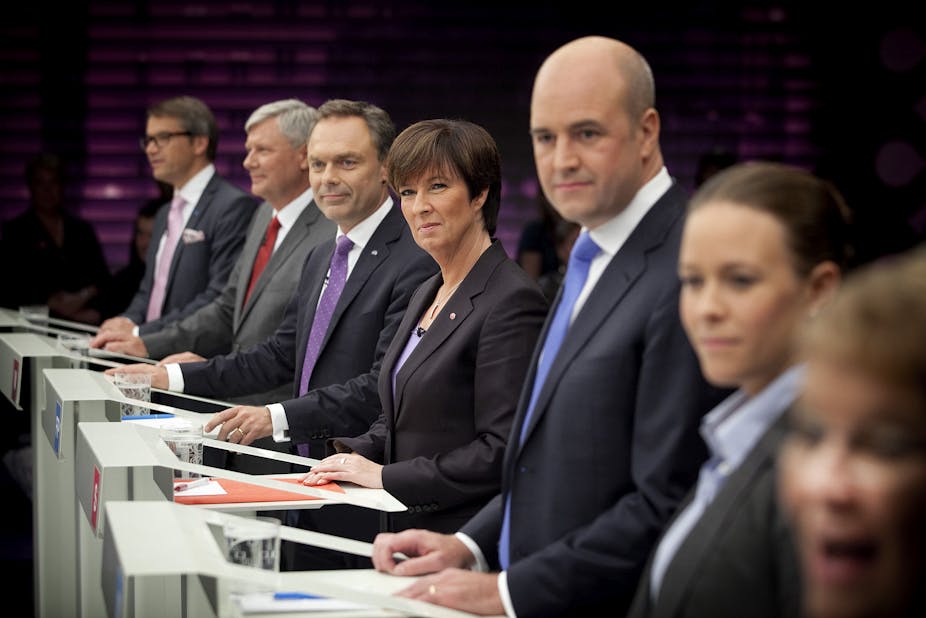Don’t tell them this, but UKIP are the most European party out there. Britain’s democracy is increasingly diverse and complex, and with the growth of UKIP on the right and the Greens on the left its political system is starting to look much more like its near neighbours’.
Like their sister European parties, the Sweden Democrats, and the populism of the Danish People’s Party or “Alternative for Germany” (AfD), UKIP are riding on a wave of discontent with globalisation, seeking to reclaim an idealised version of the nation state.
This creates a thorny issue for Britain, home to the self-declared “Mother of all Parliaments”. The next election could well yield a government elected on as little as 30% of the overall vote. Meanwhile, both UKIP and the Greens could attract significant support and get no further than the handful of seats they already hold.
In UKIP’s case they have been brought in from the cold by the BBC and other media. For the time being the Greens are being made to wait outside, whilst Plaid Cymru and the SNP have been told to save themselves train fare entirely.
Take a chance on Sweden
Contrast the awkward situation of the UK with Sweden, which is often held up as a model democracy. There are two key points to be made about Sweden – not everybody is left wing, and Swedish voters are not exceptional in their preferences, compared with the rest of Europe. It does, however, have a proportional voting system, a pluralistic media landscape and a higher degree of state support for political diversity.
Since the 1980s, it has seen a fragmentation of its political landscape with the emergence of Christian, Green, populist right and most recently Feminist political parties. The Feminists very narrowly missed out on a place in parliament at the last elections thanks to a 4% threshold, but once inside parties can be expected to be treated equally.
The most recent parliamentary debates had no fewer than eight parties asking voters to take a chance on them. Had the Feminists broken through it would have become nine. This applies even to extremist parties such as the Sweden Democrats. It is one of the ironies of a truly democratic public sphere that takes the time to dissect the views of parties which openly challenge elements of that same liberal democracy.
Sweden also regularly hosts debates in which parliamentary leaders cross examine one another, in parliament and on television. In Westminster, where the chamber is physically divided between government and opposition, this would be almost impossible.

If the UK were to go Scandinavian, it could mean Caroline Lucas cross examining David Cameron, or UKIP answering to the SNP. Despite his close friendship with former Swedish Prime Minister Fredrik Reinfeldt, it is doubtful the Prime Minister is keen on this model. After all, a third of the far right’s voters came directly from Reinfeldt.
Scotland’s Eurovision
Nowhere is this reluctance more obvious than in the devolved UK parliaments. For a brief period in the early 2000s the Scots celebrated a so-called “rainbow parliament”, with a very European looking lineup of Socialist, Green, Labour, Liberal and Conservative parties, as well as the SNP. The Greens and Socialists were never invited to televised debates or covered by BBC Scotland to the same degree as the other Scottish parties though.
Like the traditional narrative of Tory or Labour in Westminster, the media has portrayed Holyrood’s supposedly model system largely as a struggle between Labour and the SNP. For all its talk of difference and a special character, Scotland has stayed resolutely tied to what people in mainland Europe refer to as the Anglo-Saxon model.
Europe’s last revolution?
European style democracy in the UK would not be a consensual utopia. The type of deadlocks common in French, Italian or Scandinavian politics with multiple negotiators would blow apart government in its current form. It would mean UKIP and the Greens staying for good, providing diversity but introducing a radicalism, which the political mainstream would be deeply uncomfortable with.
Left-wing commentator Owen Jones recently urged people to mobilise and stop the Greens from undermining Labour’s majority. Britain is seemingly still unsure whether democracy is something to be negotiated or facilitated, and the Anglo-Saxon way is definitely far simpler.
May’s election will be a test as to whether Britain’s flirtation with pluralism is mere wishful thinking, or the start of a new era in UK politics. Nigel Farage, the most Anglo-Saxon of them all, is the unwitting torch bearer of Britain’s European transformation. Whatever he and his party might say, we’re not so different.

